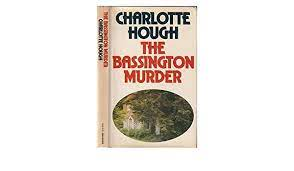Charlotte Hough's The Bassington Murder, published in Britain and the US in 1980, is a curiosity. It's the only crime novel of an author (1924-2008) who had previously achieved success as an illustrator and author of children's books. There are a number of reasons why authors desert crime writing after a solitary effort, as Christine Poulson and I discussed at Bodies from the Library in June. Charlotte Hough was perhaps unique in that her literary career was killed off by the fact that she served a term in prison for attempted murder.
I first heard of Charlotte Hough from Eileen Dewhurst, who met her the first time she attended a CWA conference in 1980, and was greatly charmed by her. This was at the time shortly after Charlotte's marriage had ended and when The Bassington Murder was just about to be published. Charlotte was evidently a funny and endearingly eccentric woman, who was a great friend of that fine writer Celia Fremlin. The three women became good friends and Eileen visited Celia and Charlotte in London from time to time.
Like Celia, Charlotte believed in allowing people to die with dignity, but in 1984, she was arrested for assisting another woman to take her own life. Eileen noted in her diary that Charlotte was 'without a grain of self-pity', but she served six months in jail, a terrible ordeal. Charlotte remarried in 1997, but by that time she seems to have left the literary world far behind her. Although I met Celia, I never came across Charolotte. She never wrote about her experience in prison, and one of her children, that fine writer Deborah Moggach, has when interviewed expressed regret about this.
There are some good ingredients in The Bassington Murder. It opens on Harriet Charles' 60th birthday. She is beginning a new life after a career as a head teacher, moving to a cottage in the village of Bassington. Eileen speculated that Harriet was based on Charlotte's friend, and fellow children's writer Winifred Lear.
The story begins enjoyably, but is overcrowded with characters and there's a lack of focus which means it's not as easy to care about them as it should be. It's hard to disagree with the stern verdict of Kirkus Reviews, that after murder is done, the story 'collapses into silliness'. A shame, because there are some nice touches. Would Charlotte Hough have developed into a significant crime writer, had personal traumas not got in the way? To be honest, I doubt it, but it's clear that she was an extraordinary woman who does not deserve to be remembered solely because of the crime of which she was convicted.

1 comment:
The "crime" of which she was convicted...
I don't know the details of Hough's conviction, but it's likely that today she would receive probation or a suspended sentence or even not be prosecuted.
Post a Comment